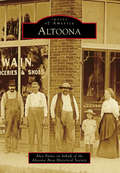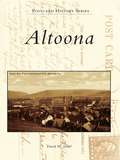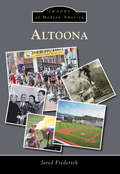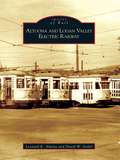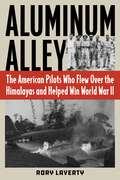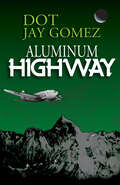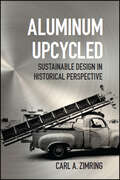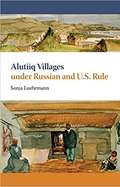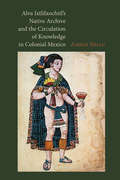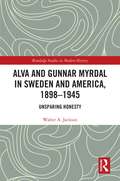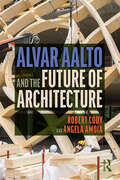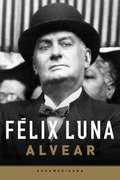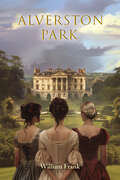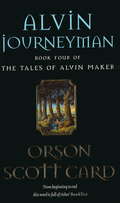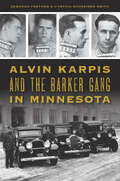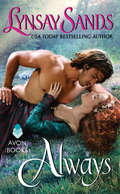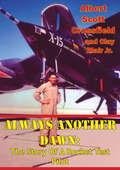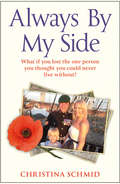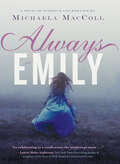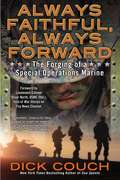- Table View
- List View
Altoona
by Alex Payne Altoona Area Historical SocietyFounded in 1868, Altoona was once just a small town on the prairie--at least until the planes, trains, and automobiles came. Trains started crossing this town as planes made their way to the Altoona Airport, and the construction of Interstate 80 on Altoona's north edge brought many tourists. The growing community has become known across the state as the "Entertainment Capital of Iowa." Altoona is home to Adventureland Park, Iowa's largest amusement park, as well as Prairie Meadows Racetrack and Casino, and it hosted the state's first municipal airport, Hanna Air Field. Various innovative individuals called this community home, such as Robert Townsend with his single-pass color printer and George Kurtzweil and his idea to grow the first acre of hybrid seed corn. Altoona's history espouses a unique combination of small-town Iowa traditions and progressive thinkers that make it unforgettable.
Altoona
by David W. SeidelThe Pennsylvania Railroad was incorporated in 1846 and immediately began the task of finding an all-rail route to connect Philadelphia with Pittsburgh. The Pennsylvania Railroad surveyed possible routes and arrived on a valley floor at the base of the Allegheny Mountains in 1849 that was primarily occupied by the David Robeson farm. As people arrived for employment opportunities, the railroad company purchased the Robeson farm, laid out the plan of a town, and named it Altoona. Shops were established, and crafts were needed as locomotive and car design and building evolved, all with increasing population and prosperity. Altoona grew from farmland to 75,000 people in 75 years.
Altoona
by Jared FrederickFor over a century, Altoona, Pennsylvania, was a bustling industrial hotbed. The town thrived as a gem of the Pennsylvania Railroad, which constructed some 6,000 steam locomotives. However, like so many communities in the wake of World War II, Altoona struggled amidst deindustrialization and cultural shifts. The 1968 end of the Pennsylvania Railroad, a decreasing population, and a dying downtown slowly made the city a shadow of its former self. However, recent developments reveal potential--as is seen in the corporate presence of Norfolk Southern and Sheetz. Additionally, the growth of Penn State Altoona, regional health care systems, and the Altoona Curve baseball club continue to make the city and its environs a unique place within the heart of the Allegheny Mountains.
Altoona and Logan Valley Electric Railway
by Leonard E. Alwine David W. SeidelDating back to 1882, the Altoona and Logan Valley Electric Railway has humble origins, but it quickly became a viable transportation system serving the city of Altoona. Often referred to as the Logan Valley, the railway employed 300 people, transported 11.5 million passengers a year, and traveled 7,220 scheduled route miles a day until economic conditions forced the line to discontinue service on June 2, 1954. Altoona and Logan Valley Electric Railway documents the history of a streetcar network that served the employees of the Pennsylvania Railroad as well as the community. Through 200 images and informed narrative, this book retraces the history of the Altoona and Logan Valley Electric Railway and its successor, the Logan Valley Bus Company.
Aluminum Alley: The American Pilots Who Flew Over the Himalayas and Helped Win World War II
by Rory LavertyBy the time Japan attacked Pearl Harbor on December 7, 1941, China was already under siege. The Imperial military invaded and choked off every land and sea route for the young country&’s resupply, and what remained of China was out of gas and withering away. So in April 1942 the United States decided to help out, by trying something entirely new and a little bit crazy. The world&’s first airlift. Over the Himalayas. Led by brilliant and stubborn American generals including Joseph Stilwell, Claire Chennault, and William Tunner, this improvised lifeline for Chiang Kai-shek&’s nationalists aimed to keep more than a million Japanese troops tied up in an unwinnable occupation, far away from the brutal combat then unfolding in the Pacific. For 42 months the American &‘Hump pilots&’ flew aviation gas, ammunition, food and other life-or-death cargo from Assam, India over Burma and the eastern Himalayas and into southern China. Frequent ice storms, unpredictable Japanese air attacks, impenetrable jungles, and the often-invisible presence of 15,000 feet of granite and ice were a formidable challenge for young American pilots in bare-bones cargo planes with primitive instruments and no margin for error. One out of every three airmen who flew the Hump would not make it home.Aluminum Alley is the true story of an unheralded group of pilots in a cursed and forgotten theater of combat, over the world&’s highest mountains and deepest jungles – all to help the Allies defeat Japan in World War II. Based on interviews with survivors of the Hump and the airmen&’s letters, journals, flight logs and other resources, this is narrative nonfiction with the immediacy and intimacy of memoir and the big-picture analysis of the best military history.
Aluminum Highway
by Dot Jay GomezJUNE 1944: It is a time of pipes, cigars, Lucky Strikes, chocolate, and whiskey. The world is at war. It takes oxygen masks and heated flight suits for crews to fly 25,000 feet above ground level, in temperatures below 50 degrees over the Himalayas, commonly called &‘The Hump.&’The air route wound its way into the high mountains and deep gorges between north Burma and west China, where violent turbulence, 125 to 200 mph (320 km/h) winds,icing, and inclement weather conditions are a regular occurrence.The premier cargo ships, C-46 Commando & C-47 Sky Train, are known to crash frequently. Four young friends and flight officers with the Army Air Corps, vow to make it safely through the Pacific War while assigned to fly The Hump for the CBI, China, Burma, India Theater.They must fly 750 hours, or complete 6 months with Air Transport Command before going home.
Aluminum Upcycled: Sustainable Design in Historical Perspective (Johns Hopkins Studies in the History of Technology)
by Carl A. ZimringTracing the benefits—and limitations—of repurposing aluminum.Besides being the right thing to do for Mother Earth, recycling can also make money—particularly when it comes to upcycling, a zero waste practice where discarded materials are fashioned into goods of greater economic or cultural value. In Upcycling Aluminum, Carl A. Zimring explores how the metal’s abundance after World War II—coupled with the significant economic and environmental costs of smelting it from bauxite ore—led to the industrial production of valuable durable goods from salvaged aluminum. Beginning in 1886 with the discovery of how to mass produce aluminum, the book examines the essential part the metal played in early aviation and the world wars, as well as the troubling expansion of aluminum as a material of mass disposal. Recognizing that scrap aluminum was as good as virgin material and much more affordable than newly engineered metal, designers in the postwar era used aluminum to manufacture highly prized artifacts. Zimring takes us on a tour of post-1940s design, examining the use of aluminum in cars, trucks, airplanes, furniture, and musical instruments from 1945 to 2015. By viewing upcycling through the lens of one material, Zimring deepens our understanding of the history of recycling in industrial society. He also provides a historical perspective on contemporary sustainable design practices. Along the way, he challenges common assumptions about upcycling’s merits and adds a new dimension to recycling as a form of environmental absolution for the waste-related sins of the modern world. Raising fascinating questions of consumption, environment, and desire, Upcycling Aluminum is for anyone interested in industrial and environmental history, discard studies, engineering, product design, music history, or antiques.
Alumnae Theatre Company: Nonprofessionalizing Theatre in Canada
by Robin C. WhittakerDelving into previously untapped archival resources, Alumnae Theatre Company traces the history and ongoing impact of North America’s longest-running women-led theatre group, Toronto’s Alumnae Theatre Company. The book illuminates the essential yet downplayed relationships between professional and nonprofessionalizing theatre practices, drawing on primary and secondary sources that have contributed to the practice and scholarship of theatre since the early twentieth century. It uses Alumnae as a case study for recognizing female leadership roles that support the development of theatre artists in Canada. The book considers Alumnae’s historical influences on university philanthropy, intellectual modernism, and Toronto’s expanding theatre ecology. It revisits past eras to focus on four dominant perspectives: theatre spaces, festival competition, new play production, and nonprofessionalizing theatre’s relationship to an emerging profession. The book tethers Alumnae’s alterity to contemporary critical notions of the nonprofessionalizing theatre practitioner as counter-culture revolutionary. It urges scholars and practitioners alike to not take for granted the values and possibilities of contemporary nonprofessionalizing theatre practices. Alumnae Theatre Company also serves as a fascinating history of Toronto through the eyes of its oldest active theatre company.
Alutiiq Villages Under Russian and U. S. Rule
by Sonja Luehrmann S. LuehrmannSonja Luehrmann’s volume examines Alutiiq history within the larger context of Russian and American expansionism. The author uses source material in both English and Russian in order to create a work focused on the intersection of the two colonial perspectives—throwing light on our understanding of the differences in the way each society incorporated the Alutiiq community, both as a labor force and a social entity. In a series of map essays, Luehrmann examines the changing patterns of settlement and demography among the Alutiiq as the population responded to the conditions they encountered: economic exploitation, new cultural influences, intermarriage, disease, and the eruption of Novarupta. The addition of Russian source material fills an important blank in this unique history and makes Alutiiq Villages Under Russian and U.S. Rule a major resource for anyone working on Alutiiq history or the region’s history in the Russian colonial period.
Alva Ixtlilxochitl's Native Archive and the Circulation of Knowledge in Colonial Mexico
by Amber BrianModern Language Association's Katherine Singer Kovacs Prize, Honorable Mention, 2016 Born between 1568 and 1580, Alva Ixtlilxochitl was a direct descendant of Ixtlilxochitl I and Ixtlilxochitl II, who had been rulers of Texcoco, one of the major city-states in pre-Conquest Mesoamerica. After a distinguished education and introduction into the life of the empire of New Spain in Mexico, Ixtlilxochitl was employed by the viceroy to write histories of the indigenous peoples in Mexico. Engaging with this history and delving deep into the resultant archives of this life's work, Amber Brian addresses the question of how knowledge and history came to be crafted in this era. Brian takes the reader through not only the history of the archives itself, but explores how its inheritors played as crucial a role in shaping this indigenous history as the author. The archive helped inspire an emerging nationalism at a crucial juncture in Latin American history, as Creoles and indigenous peoples appropriated the history to give rise to a belief in Mexican exceptionalism. This belief, ultimately, shaped the modern state and impacted the course of history in the Americas. Without the work of Ixtlilxochitl, that history would look very different today.
Alva Ixtlilxochitl’s Native Archive and the Circulation of Knowledge in Colonial Mexico
by Amber BrianBorn between 1568 and 1580, Alva Ixtlilxochitl was a direct descendant of Ixtlilxochitl I and Ixtlilxochitl II, who had been rulers of Texcoco, one of the major city-states in pre-Conquest Mesoamerica. After a distinguished education and introduction into the life of the empire of New Spain in Mexico, Ixtlilxochitl was employed by the viceroy to write histories of the indigenous peoples in Mexico. Engaging with this history and delving deep into the resultant archives of this life's work, Amber Brian addresses the question of how knowledge and history came to be crafted in this era.Brian takes the reader through not only the history of the archives itself, but explores how its inheritors played as crucial a role in shaping this indigenous history as the author. The archive helped inspire an emerging nationalism at a crucial juncture in Latin American history, as Creoles and indigenous peoples appropriated the history to give rise to a belief in Mexican exceptionalism. This belief, ultimately, shaped the modern state and impacted the course of history in the Americas. Without the work of Ixtlilxochitl, that history would look very different today.
Alva and Gunnar Myrdal in Sweden and America, 1898–1945: Unsparing Honesty (Routledge Studies in Modern History)
by Walter A. JacksonAlva and Gunnar Myrdal are the only couple ever awarded Nobel prizes as individuals: Gunnar won the prize in Economics in 1974, and Alva won the Peace Prize in 1982. This dual biography examines their work as architects of the modern welfare state and probes the connections between the public and private dimensions of their lives. Drawing on their extensive personal correspondence and diaries between their electrifying first meeting in 1919 and their protracted marital crisis in the early 1940s, this book presents the psychologist and the economist as they sought to combine love and work in an equal partnership. Alva and Gunnar simultaneously experimented with a new kind of intimate relationship and designed the social supports necessary for women both to bear and raise children and to contribute their talents and energies to society. Like all genuine revolutionaries, they struggled to free themselves from the burdens of their upbringings; to evaluate their own actions with what they called "unsparing honesty," and to test their policy recommendations in practice, measuring everything against the values they shared.
Alvar Aalto and Urban Design
by Robert Cody Angela AmoiaThis book provides a fresh look at Alvar Aalto’s regional and community planning work, particularly the ways in which he incorporated sustainability, resiliency, energy, and health, and examines how contemporary architects and planners can learn from this approach for the betterment of 21st-century urban design and our future cities.The Alvar Aalto Atelier planned and promoted regional development that combined ecological features, considered density, and offered a framework for informality, including flexible, adaptable infrastructures, with physical plans integrating communities with nature. These plans were largely suburban and contained vital lessons on how to deal with sprawl, traffic, landscape, energy, labor, and industry. This book analyzes letters, writings, and drawings not seen outside the Alvar Aalto Foundation, to review alternative ways to examine suburban landscapes and urban typologies, through sustainability, ecology, and use of digital technologies.This is an essential read for all those interested in the urban design work of Alvar Aalto. Written in an accessible way for those new to the work of Aalto, Architecture and Urban Design students of all levels will also find this a helpful guide on ecologically and socially responsible design.
Alvar Aalto and the Future of Architecture
by Robert Cody Angela AmoiaIn the contemporary practice of architecture, digital design and fabrication are emergent technologies in transforming how architects present a design and form a material strategy that is responsible, equitable, sustainable, resilient, and forward-looking. This book exposes dialogue between history, theory, design, construction, technology, and sensory experience by means of digital simulations that enhance the assessment and values of our material choices. It offers a critical look to the past to inspire the future. This new edition looks to Alvar Aalto as the primary protagonist for channeling discussions related to these topics. Architects like ALA, Shigeru Ban, 3XN, Peter Zumthor, and others also play the role of contemporary guides in this review. The work of Aalto and selected contemporary architects, along with computer modeling software, showcase the importance of comprehensive design. Organized by the five Ts of contemporary architectural discourse—Typology, Topology, Tectonics, Technic, Thermodynamics—each chapter is used to connect history through Aalto and develop conversations concerning historical and contemporary models, digital simulations, ecological and passive/active material concerns, construction and fabrications, and healthy sensorial environments. Written for students and academics, this book bridges knowledge from academia into practice and vice versa to help architects become better stewards of the environment, make healthier and more accountable buildings, and find ways to introduce policy to make technology a critical component in thinking about and making architecture.
Alvar Aalto in the Finnish Context (Routledge Research in Architecture)
by Kirmo MikkolaThis book, first published in Finnish in 1985 under the title Aalto, is a critical introduction to Finnish architect Alvar Aalto (1898–1976), written by one of Aalto’s Finnish architectural contemporaries, Kirmo Mikkola (1934–1986). The book is divided into six sections dealing with different aspects of Aalto’s architecture, from his classical beginnings to urban planning, as well as his various professional and intellectual associates.Mikkola debunks the common opinion of a reticent Aalto to determine the roots of his thinking, seeing him as a mediator of influences from a wide variety of sources. The book was originally targeted at a Finnish audience, and so its translation requires ‘interpreters’, two architect-scholars who knew Mikkola well, Juhani Pallasmaa, and Aino Niskanen. The book also sheds light on a young generation of Finnish architects that distanced itself from Aalto as a role model, pinpointed here by the inclusion of the essay ‘Snowballs’ (1948) by Aulis Blomstedt.Often quoted by Finnish architectural scholars, the publication finally of an English translation of Mikkola’s book will appeal to those international scholars and students who have been aware of the lack of critical perspectives from Aalto’s Finnish architect contemporaries.
Alvear
by Felix LunaEn esta biografía del presidente Marcelo Torcuato de Alvear,el autor trasluce una cálida simpatía hacia el personaje que no inhibela crítica severa. En ella aparecen no solo las decisiones políticas másimportantes, sino escenas y episodios reveladores de la sociedad deentonces y de sus contradicciones. La infancia cómoda y respetable deAlvear, sus viajes a Europa, su matrimonio con Regina Pacini, susactuaciones políticas tempranas, su amistad con Yrigoyen, la vocaciónque lo obligó a asumir una labor que entrañaba peligros, molestias yconstantes renunciamientos, resultan testimonio de valor incalculabletanto en lo histórico como en lo social. La Argentina es un país sin aristocracia: «Basta trepar un poco el árbolgenealógico para topar con el abuelo contrabandista o bolichero», dicecon gracia Félix Luna en este libro, publicado por primera vez en 1958.En el caso del presidente Marcelo Torcuato de Alvear su apellido,ciertamente ilustre, no le impidió afiliarse en su juventud al partidoradical y sostener este compromiso, en el triunfo y en la derrota, hastaen fin de su vida.
Alverston Park
by William FrankIn Alverston Park, author William Frank gives a deep bow to Jane Austen with a story of love and societal boundaries. Helena Mowbray, a clergyman’s daughter, warns her two younger sisters about the impossibility of marrying nobility. Yet this does little to deter the trio of charismatic Fitzosborne brothers, sons of the Earl of Alverston, who find themselves captivated by the Mowbray sisters during the London social season. Set against the opulent backdrop of Regency England, complete with grand balls, architectural splendour and society scandals, the narrative weaves in events like a secret newborn and a daring journey to Napoleon’s island prison in the South Atlantic. Through misadventures and tragedies, the tale explores the consequences of class prejudice and the elusive nature of happiness, reflecting issues still resonant in contemporary high society.
Alvin Journeyman: Tales of Alvin Maker: Book 4 (Tales of Alvin Maker #4)
by Orson Scott Card'From beginning to end, this novel is full of riches' - Booklist'The most important work of American fantasy since Stephen Donaldson's original Thomas Covenant trilogy.' - Chicago SuntimesNow a grown man and a journeyman smith, Alvin has returned to his family in the town of Vigor Church. He will share in the isolation, work as a blacksmith, and try to teach anyone who wishes to learn the knack of being a Maker. For Alvin has had a vision of the Crystal City he will build, and he knows that he cannot build it alone.But he has left behind in Hatrack River enemies as well as true friends. His ancient foe, the Unmaker, whose cruel whispers and deadly plots have threatened Alvin's life at every turn, has found new hands to do his work of destruction.Book Four of the acclaimed Tales of Alvin Maker.Books by Orson Scott Card:Alvin Maker novelsSeventh SonRed ProphetPrentice AlvinAlvin JourneymanHeartfireThe Crystal CityEnder Wiggin SagaEnder's GameSpeaker for the DeadXenocideChildren of the MindEnder in Exile HomecomingThe Memory of the EarthThe Call of the EarthThe Ships of the EarthEarthfallEarthbornFirst Formic War (with Aaron Johnston)Earth UnawareEarth AfireEarth Awakens
Alvin Karpis and the Barker Gang in Minnesota (True Crime)
by Deborah Frethem Cynthia Schreiner Smith&“The St. Paul of the gangster era springs vividly to life again . . . A captivating glimpse into a shadowy era in the city&’s history.&” —Community Reporter From their home base in Minnesota, the Karpis-Barker Gang cut a swath of crime and terror across the Midwest in the early 1930s. They kidnapped two important businessmen and held them for exorbitant ransoms. They stole payrolls and robbed banks as the bullets flew. Corrupt police and wily crime bosses helped Alvin Karpis and the Barker brothers Freddie and Doc every step of the way. Who were these men and women? What made them into killers and kidnappers? How did their reckless lifestyles lead to their downfall? From Ma Barker to Volney Davis to Edna Murray the Kissing Bandit, authors Deborah Frethem and Cynthia Schreiner Smith delve into the crimes, personalities and motivations of one of the most successful and infamous gangs in American history.
Always
by Lynsay SandsBastard daughter to the king, Rosamunde was raised in a convent and wholly prepared to take the veil . . . until good King Henry showed up with a reluctant husband in tow for her. Suddenly, she found herself promising to love, honor, and obey Aric.But Rosamunde's education had not covered a wedding night, and the stables were a poor example for an untried girl. Would Aric bite her neck like the animals did their mates? The virile warrior seemed capable of such animal passion, but his eyes promised something sweeter. And Rosamunde soon learned that while she may have trouble with obeying him, it would not be hard to lover her new husband forever.
Always Another Dawn: The Story Of A Rocket Test Pilot
by Clay Blair Albert Scott CrossfieldAll his life Test Pilot Scott Crossfield has carried on a love affair with airplanes. As a child he learned secretly how to fly, and the unyielding ambition to become a superb aviator spurred him to overcome a serious childhood disease. Working for the NACA (National Advisory Committee for Aeronautics), Crossfield achieved national renown testing the rocket-powered planes, X-1 and Skyrocket, taking them to amazing heights where "man had a new view of his life and the world." He has logged more rocket plane flights than most of the chief test pilots combined.Written in the tradition of Saint-Exupéry and Lindbergh, Scott Crossfield's inspiring autobiography is a testament to the adventure and achievement of the flight pioneers who dare to live beyond the clouds. Why is "death the handmaiden of the pilot" and how does it feel to face her fifteen miles above the ground? What can a pilot do when fear and panic overtake him? What is it like to be the first man to fly at twice the speed of sound? These are some of the questions Crossfield answers as he explains why he was prepared to devote so much of his time, his dreams, and his aspirations to an experimental plane called the X-15.Always Another Dawn tells of the birth of this plane; the daring of the men who painstakingly designed and built her, counting every extra pound a danger and creating innovations unprecedented in flight history. Here is the courage of the men who flew her, their every take-off a hazardous journey into the unknown.This book is the thrilling story of man's first faltering steps into space, of the great experiment and the great pilot who "set man on his path toward the stars."
Always Be My Duchess (Taming of the Dukes #1)
by Amalie HowardA Cosmopolitan Best Romance of 2022 Pretty Woman meets the Bridgertons in this witty, vivacious historical take on 90s romcoms by USA Today bestselling author Amalie Howard. Lord Lysander Blackstone, the stern Duke of Montcroix, has only one interest: increasing his considerable fortune. After a series of betrayals, he keeps his emotions buried deep. Money, after all, can't break a man's heart—or make promises it can&’t keep. But when his reputation for being heartless jeopardizes a new business deal, he finds himself seeking a most unusual—and alluring—solution . . . Once an up-and-coming ballerina, Miss Geneviève Valery is now hopelessly out of work. After refusing to become a wealthy patron's mistress, Nève was promptly shown the door to the streets. When she accidentally saves the life of a handsome duke, she doubts the encounter will go any better than her last brush with nobility. But instead of propositioning her, Montcroix makes Nève an offer she would be a fool to refuse: act as his fake fiancée in exchange for fortune enough to start over. Only neither is prepared when very real feelings begin to grow between them. They both stand to win . . . but only if they&’re willing to risk their hearts.
Always By My Side: Losing the love of my life and the fight to honour his memory
by Christina SchmidA LOVE LOST.A LIFE CUT SHORT.'From the moment I set eyes on him I adored him. The connection between us was so strong it went beyond everything else. His job, my job, his lifestyle, my lifestyle. All that fell away.'And then one earth-shattering day Christina's worst nightmare came true when Oz was killed on his final day of duty before flying home to his family.This is Christina and Oz's story: a story about love and loss, hope and despair and of living in constant fear. Christina's extraordinary bravery and composure is an inspiration to anyone who has ever lost someone they love.
Always Emily: A Novel
by Michaela MaccollEmily and Charlotte Brontë are about as opposite as two sisters can be. Charlotte is practical and cautious; Emily is headstrong and imaginative. But they do have one thing in common: a love of writing. This shared passion will lead them to be two of the first published female novelists and authors of several enduring works of classic literature. But they're not there yet. First, they have to figure out if there is a connection between a string of local burglaries, rumors that a neighbor's death may not have been accidental, and the appearance on the moors of a mysterious and handsome stranger. The girls have a lot of knots to untangle--before someone else gets killed.
Always Faithful, Always Forward
by Dick CouchEstablished in 1986, the U.S. Special Operations Command was set up to bring the special operational disciplines of all branches of the military under a single, unified command to act on missions involving unconventional warfare, special reconnaissance, foreign internal defense, and direct action... The Marine Special Operations Command ("MARSOC") is the newest component of the military's shift toward a fully integrated Special Operations Command structure. At first, the Marines were strongly against any Marines serving under anyone other than another Marine. Then 9/11 happened. In the years following, Marine forces found themselves growing more agreeable to inter-branch operational command, finally forming the Marine Special Operations Command in 2006. Always Faithful, Always Forward follows the journey of a class of Marine candidates from their recruitment, through assessment and selection, to their qualification as Marines Special Operators. The assessment, selection, and training regimes are a combination of psychological testing and intense military training as well as being a physical and professional rite of passage. MARSOC Marines must be efficient, agile, independent, and prepared to live hard in the field. They are warriors trained in the full range of military skills, as well as teachers who can train locals to defend their communities and lead them in battle. But above all, they are Marines. Their ability to leverage their numbers by embedding with the locals and to live in remote locations has, in their short history, made them a valuable force and one with great utility in remote reaches of the world. Retired Navy Captain Dick Couch has been given unprecedented access to this new command and to the individual Marines of this exceptional special-operations unit, allowing him to chronicle the history and development of the Marine Special Operations Command and how they find, recruit, and train their special operators. INCLUDES PHOTOGRAPHS
